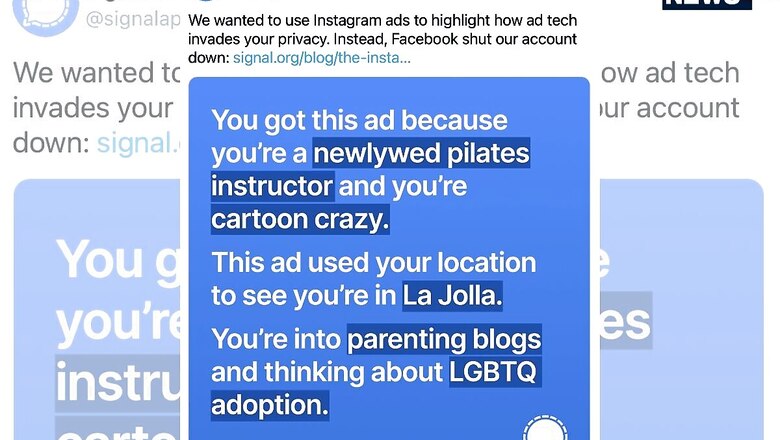
views
Signal is having a brilliant 2021. Facebook, perhaps not so much. At least not by its own standards and expectations. The year started out with the criticism of the new WhatsApp privacy policy which was attempted to be bulldozed through. It was delayed, albeit temporarily. That move saw a lot of users switch to privacy focused messaging apps such as Signal and Telegram. The pitch was simple then, and it remains simple now—privacy for you and your data, which a Facebook owned app cannot provide. Now, Signal is widening the scope with its latest attack, as the May 15 deadline for the application of the delayed WhatsApp Privacy Policy, looms into view. It is now going after Facebook, and the Facebook owned apps including Instagram, WhatsApp and Messenger.
Signal’s experiment comes at a time when Facebook is seeing its powers to track and collect data get curtailed, increasingly so. Users are becoming more aware, and Apple has already given users the choice to say a vehement no to tracking. “Companies like Facebook aren’t building technology for you, they’re building technology for your data. They collect everything they can from FB, Instagram, and WhatsApp in order to sell visibility into people and their lives,” says Signal, no words minced. Signal is attempting to run a test to show what a lot of us already believe is true—the data collected between WhatsApp, Facebook and Instagram is shared to create a virtual profile of users so that the targeted ads are uncannily precise and timely. Signal believes that Facebook’s own tools can often reveal the truth about the “dimly concealed within complex, opaquely-rendered systems and fine print designed to be scrolled past.” Signal says they bought some Instagram ads and created multi-variant targeted ad designed to show users the personal data that Facebook collects about and sells access to.
Signal collected some specific user characteristics to share in the ads they created “Facebook is more than willing to sell visibility into people’s lives, unless it’s to tell people about how their data is being used,” says Signal. This should wake people up to the reality that the ads you see on social networks come from all the data that is collected from you, knowingly or unknowingly. Eventually, the ad account was disabled. It is hard to say what really happened at this point. Facebook has denied the allegations, in a statement shared with Forbes. “If Signal had tried to run the ads, a couple of them would have been rejected because our advertising policies prohibit ads that assert you have a specific medical condition or sexual orientation, as Signal should know. But, of course, running the ads was never their goal—it was about getting publicity,” says Facebook. It is perhaps referring to some adverts that Signal made which makes reference to LGBTQ, divorce, had a new baby and parenting blogs.
This could just tie in with how Apple is clamping down on apps such as Facebook tracking users across other websites and apps to collect more behavioural data, and serve ads. The way the App Tracking Transparency feature works is that when you open an app on your iPhone, for the first time or after an update, you will be asked, “Allow XYZ to track your activity across other companies’ apps and websites?” The two options you will have at this stage would be “Ask App not to Track” or “Allow”. The App Tracking Transparency feature will be part of the Privacy menu in the Settings app. An iPhone user will now be able to choose whether they want to allow or deny an app from tracking their browsing and app usage trends. The idea is simple—disclosure and choice. This will apply to all apps installed on your iPhone, if they need to track your usage across other apps and websites. Apple has very clearly defined app tracking includes but isn’t restricted to showing targeted advertisements app based on user data collected from apps and websites owned by other companies, s haring device location data or email lists with a data broker as well as sharing a list of emails, advertising IDs, or other IDs with a third-party advertising network that uses that information to retarget those users in other developers’ apps or to find similar users.
No wonder Facebook hasn’t been impressed about all this, even more so now that the feature is available for all iPhone users with the iOS 14.5 and the iOS 14.5.1 updates. Facebook, over the past few months, has been very vocal in its criticism of Apple’s App Tracking Transparency feature. No surprises there. The lack of disclosure and choice is what Facebook has bet heavily on over time, tracking what you browse for, shop for and what you use apps for, on your phone, tablet, PC and pretty much any computing device in your workflow. How else do you think you’d get those uncannily well-targeted ads just at the right time on your Facebook or Instagram feed? The new privacy measures will apply to all apps on your iPhone and on the Apple App Store. But the question still remains. With May 15 fast approaching, will users genuinely shift away from WhatsApp? Or will there be the cursory outrage on social media and everything just settles down after that?
Read all the Latest News, Breaking News and Coronavirus News here. Follow us on Facebook, Twitter and Telegram.




















Comments
0 comment